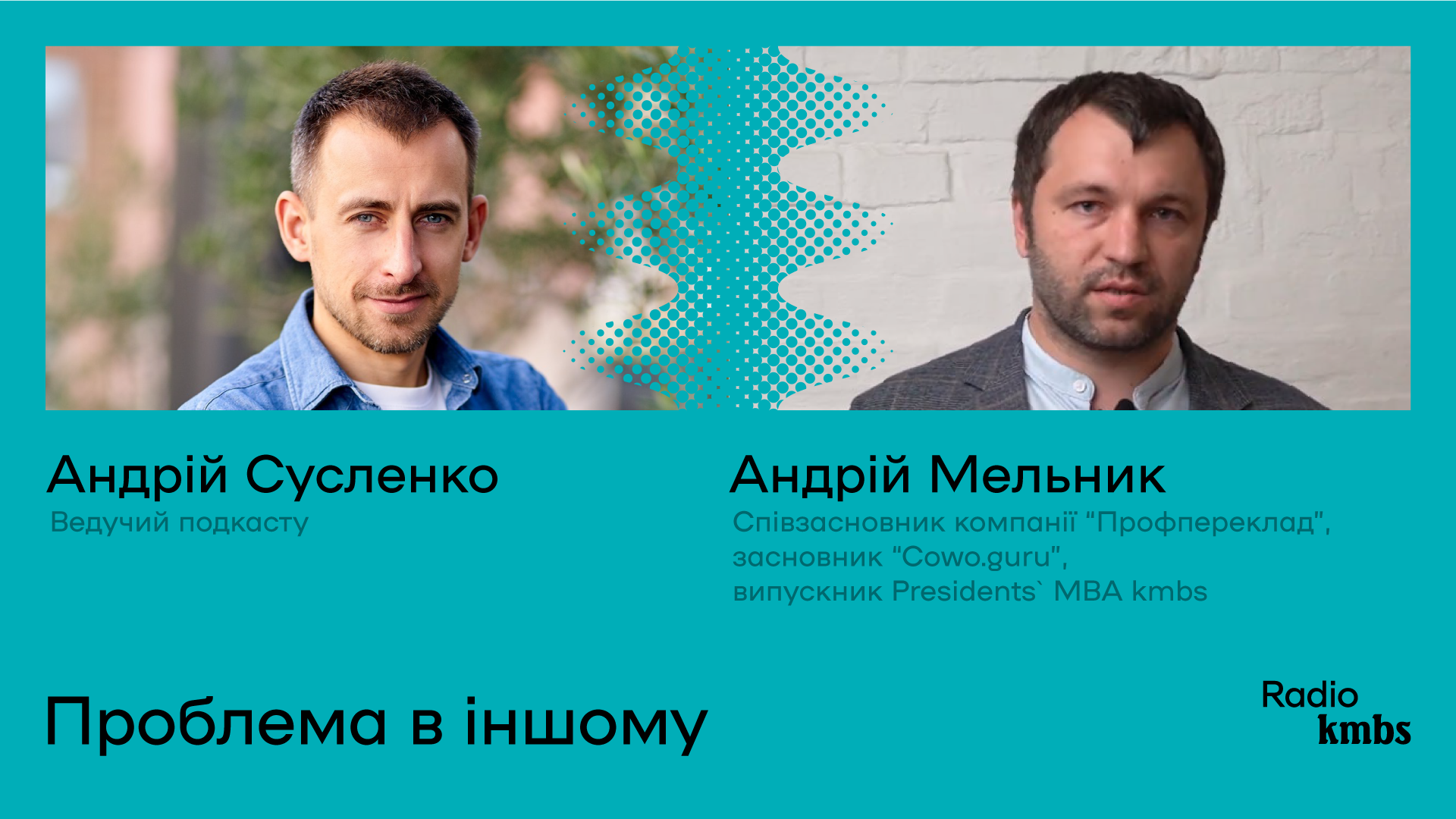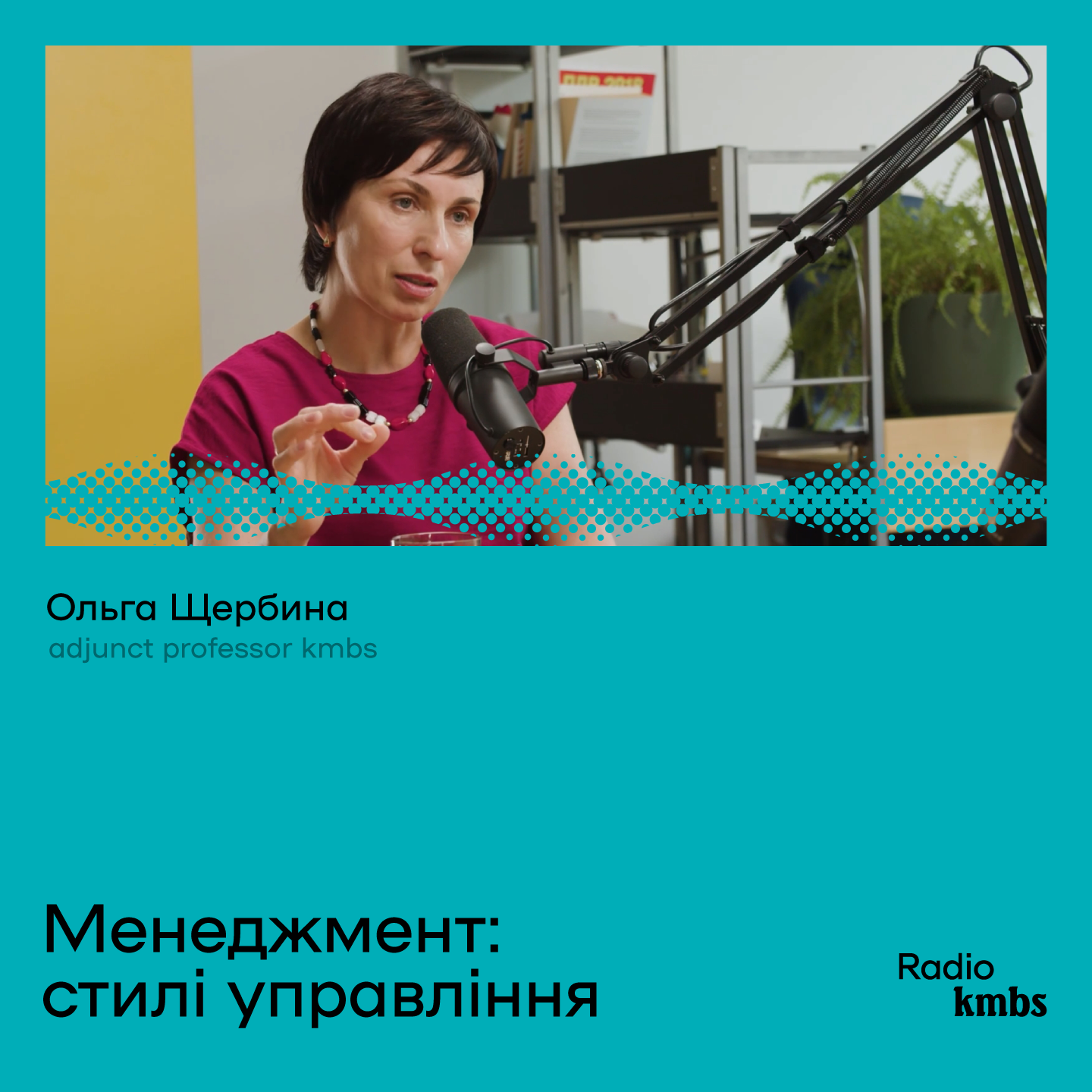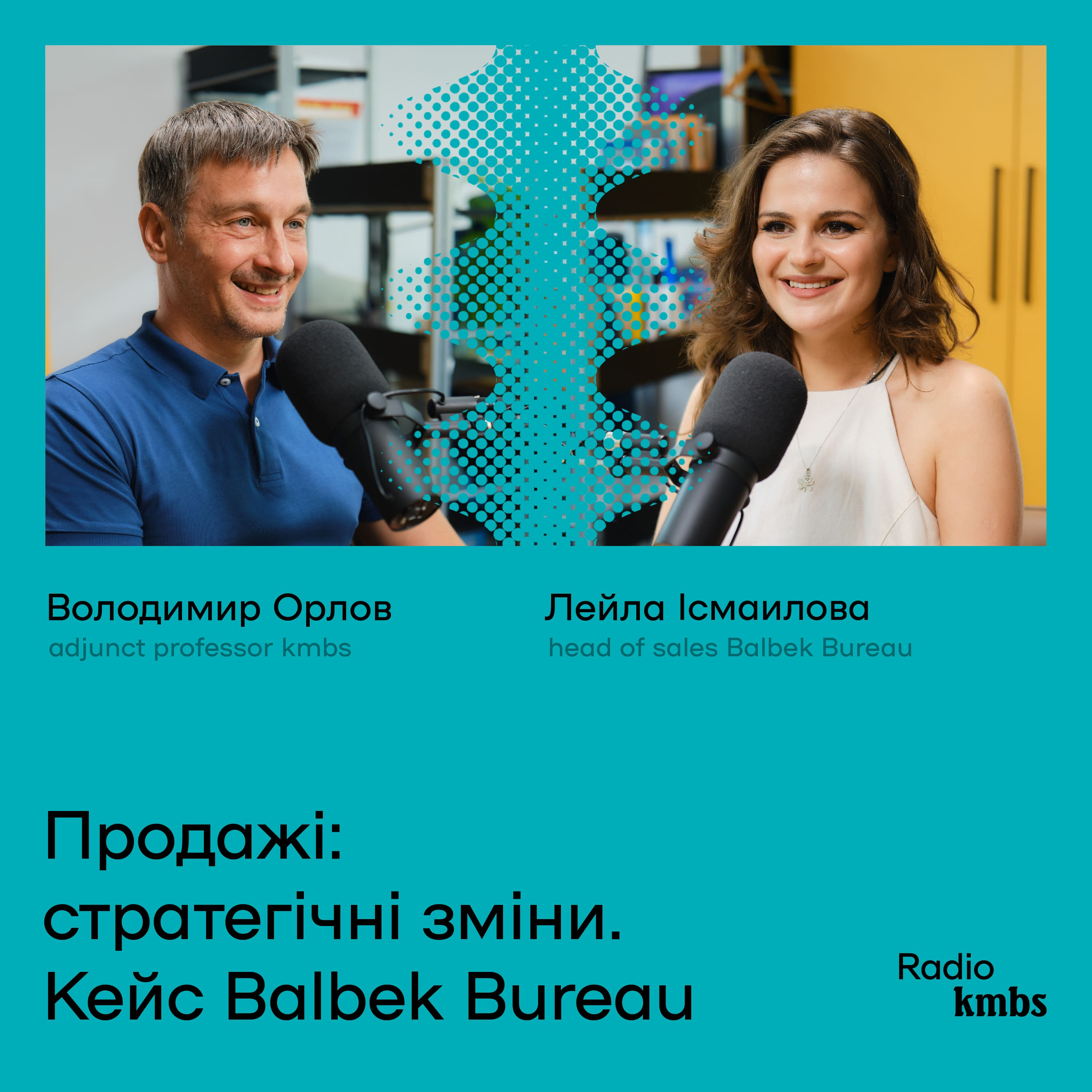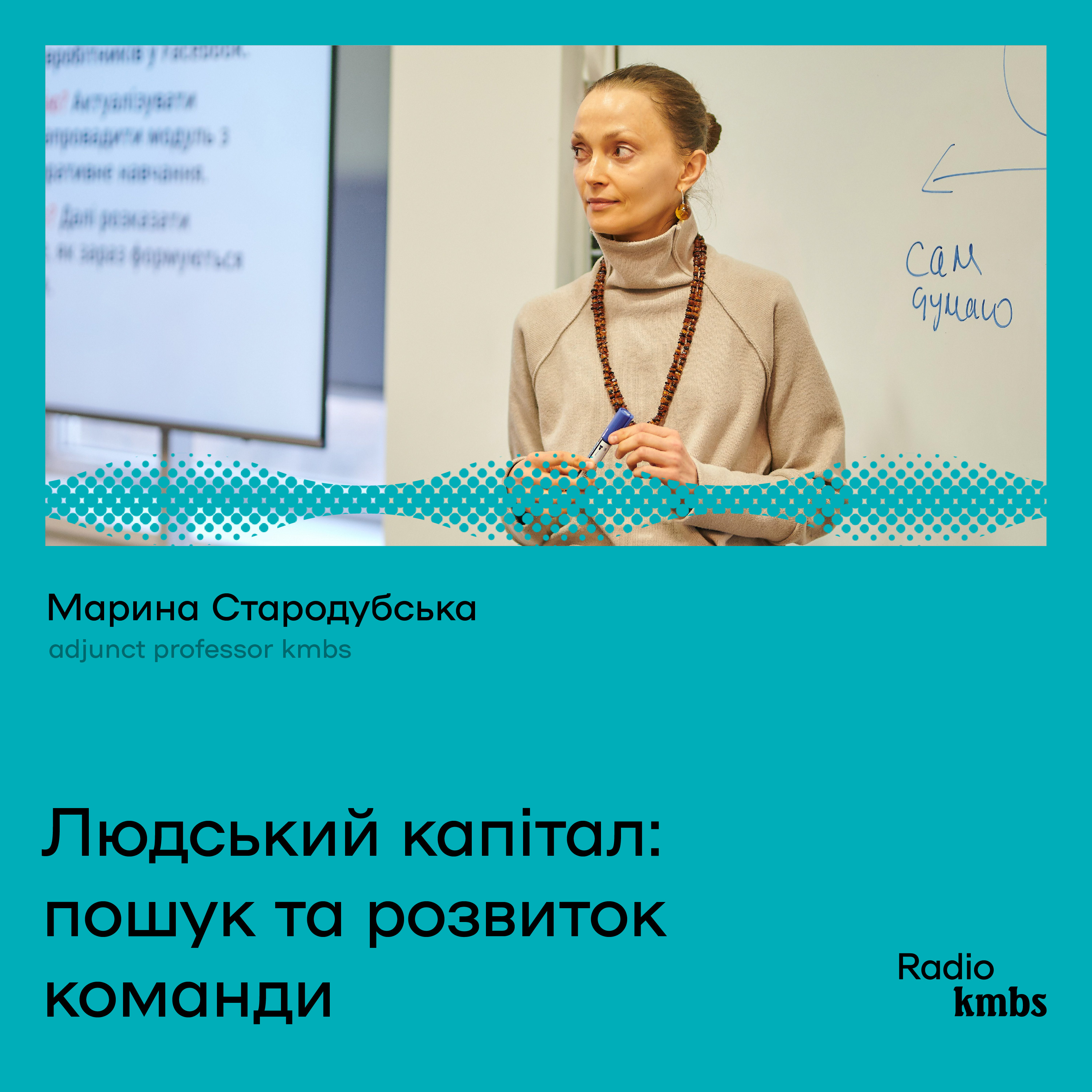Learn first
KMBS latest news in real time

For the latest KMBS events and news, visit KMBS Live at the top right corner of the screen
Open kmbs live 06.02.2023
06.02.2023 2844
2844 0min
0minAndriy Suslenko: How would you answer the question: who is Andriy Melnyk?
Andrii Melnyk: Once upon a time, a group of RMVA-14 graduates and I created a "thinking club." We pondered: what is thinking? How can you work with it? How can it be developed? One of the tasks was to formulate one's worldview in writing. Then, while doing it, I realized that I separated the concepts of an entrepreneur and a businessman.
An entrepreneur is a particular form of adventurism with which a person lives. Adventurism can be creative, or it can be destructive. Writing out my worldview, I clearly understood that a particular form of entrepreneurship is adventurism, and I take these risks. And there are specific calls from within that lead me somewhere.
At this point, I was led to a point called Cowo.guru. The core is educational, but it is a great initiative to create environments where the creative person can exist and find like-minded people, focusing on co-creation and the common good. And, in this way, recreate Ukraine through it.
The people I meet through Cowo.guru and trips to Ukraine are "gardeners". They can combine natural forces, their will and thinking, " and "plant" meanings and grow together for years. They have a long will, thinking, and thirst for risk.
A.S.: You are either prone to risk or okay with taking risks. And, indeed, you are a person of long will?
A.M.: It seems to me that when we are on a particular frontier, that is, on the border between the defined and the undefined, we need reflection and reflective thinking to move forward. And the combination of responsibility and risk occurs naturally at this point. If you are ready to go to the frontier of creation, go beyond it, and then turn back, this long will keeps you on this frontier, and your thinking and ability to take risks allow you to go beyond it. You have to be able to be there and get out.
What we will take from there is a problematic and unclear question, but there must be internal guidelines. They provide a rod to lean on.
A.S.: On a scale from 1 to 100, how much does Ukraine have a reflective society?
A.M: By 10. And if this is progress in recent years, is it progress in the last 30 years - I think not.
A.S.: It's interesting that you immediately try to see the bigger picture: "let's look at 30 years...". Did you have this skill even before studying at kmbs?
A.M.: It must have been somewhere in the sprouts. While developing the translation company "Profpereklad," I communicated with the people whose manager I was, and we always talked about the meanings and why we do what we do. Therefore, this exit to "over-" often existed in my conversations. But kmbs somewhat shake your base, and you start trying to assemble it into another model. You have to disrupt to be on the frontier - you have to let go of what was in the past, go out, and be a disruptor, but from a position of creation.
AS: Architects of the past, building temples, cathedrals, and other creations knew how the work would end but often did not live to see it. They made it beyond their lifetime. What you are talking about sounds somewhat similar to me. And what would you like to leave behind in 100 years?
A.M.: I am very interested in trying to look at society in a slightly different way. Not because of the national formula in which we exist, but can there be some other form: on the one hand, there is a large number of people, and on the other, they are not a mass. So this number has a particular subjectivity.
I don't know if this is possible or will be possible sometime in the future. Perhaps not in 100, but in thousands of years, if civilization does not decline, people will cease to be a mass and be able to be a subject person in every human manifestation.
So, I'm interested in trying to see the world differently. I still don't understand it, but I call it the "gardens of sophistry." There are islands of "gardens." They have people who unite through the cultivation of meanings. This environment is significant. It has many "gardens," and people from all over the world come together.
I talk to the Foundation for Future. They try to think in terms of "humanity." For them, humanity is the past, the present, and the future. Not all people fall into "humanity," but those who create work with the essence. And the question arises - is it possible to develop such prerequisites in society that would reveal the human, the human through this position of "humanity"?
I want to try to look at Ukraine as a place of a certain freedom, particular virtues, a certain way of thinking, and opportunities for the sprouting of something unique and accessible, which is then implemented in the world and gives birth to something new. It seems to me that this formula can exist through the humanities. And it is essential to emphasize the humanitarian development of Ukraine, Ukrainianness. Join everyone willing and try to make humanitarian innovations, and they will give rise to economic, political, etc.
A.S.: So, you enable the development of humanitarian innovations in Ukraine, which will create prerequisites for developing various industries. And you do it thanks to Cowo.guru. Who are your customers?
A.M.: Our central concept is "the way of the worldly." It is an artificially created word that combines three essential capacities: thinking, action, and measure. Some people can move along the "way of a worldly person," from thinking to action, reflecting their internal standards and being in a particular position. And this movement is directed, on the one hand, to oneself, to self-determination, and on the other hand, to interact with others.
Our strategy for the next five years is to find these "gardeners" and introduce us all to each other, to create the conditions for a common cause, an environment of peacefulness. In an environment where people think, act, and understand their red limits, they can reflect and even go beyond them but do it consciously.
A.S.: What is the meaning of the word "measure" for you?
A.M.: This is one of the key concepts with which we work. If we have no measures or one measure, then we are primitive people. If our culture is simplified and gives us one step, we become flat people. If culture creates multidimensionality, I can measure myself as a Ukrainian person, businessman, entrepreneur, pupil, student, etc., then diversity appears. And then I can reproduce my uniqueness in this culture.
A.S.: Did you create this concept at kmbs during your studies? What did the school give you anyway?
A.M.: kmbs opened a particular layer of humanitarianism to me and showed that humanitarianism could influence methodological, instrumental business. The school also shook certain foundations on which I stood.
In general, I went to kmbs with two goals: to improve my level of business training in economics and to find like-minded people with whom I can communicate on similar topics in similar formats.
The kmbs formula is the addition of humanitarian. Humanitarian is directed to work with the foundations, the foundations begin to shake, slowly crumble, and you begin to try to assemble the foundations of your business, reassembling your foundations as well. Here you understand that you need to go somewhere further.
Let's say that "Profpereklad" began to transform. We digitized the translation process as much as possible, thanks to which we increased quality and productivity and integrated it into the European context.
When we launched the transformation of Profpereklad, I began to pay more attention to the thinking club. At some stage, I left the company as a managing partner and remained a minority owner. My partner continues to manage "Profpereklad," I have engaged in Cowo.guru and developed this direction, "gardens of sophistication."
A.S.: What has changed in two years of study?
A.M.: There was a certain level-up. In general, it seems that school should generate interest in some topics, and if the claim remains, I will continue to explore it.
We continue to communicate as a group, although many years have passed since our studies. We are very different, although we seem to be in the same positions, and you cannot open everyone in one module. But in 16 modules, communicating with each one, you open it to the depth you can and understand all the diversity.
We have a specific core that meets regularly and brainstorms the initiatives we would like to launch. And then, we present these projects to our group and decide whether to go. We have created a place where we can exercise our request to influence complex systems beyond the boundaries of organizations. And here, some part of the human soul is still realized.
A.S.: Is Andriy Melnyk different before the start of his studies and after graduation?
A.M.: kmbs was a specific cumulative effect. After school, I practiced, in particular, the description of the worldview and worked with it, work with meditations and philosophical training. Without kmbs, this process would be later and different. Kmbs expanded my understanding of how to enter into certain practices.
kmbs gives you the tools to look at your business. And then the foundations on which you stand are shaking. And if you are ready to ask questions about these foundations, then a new space opens up for you.
The alternative is to go to psychologists. But it seems that a person who can work with the basics should not just be a psychologist but a philosophically trained person. I have met very few of them.
A.S.: Education often shows our limitations. When you entered the two-year study program at RMBA, you probably encountered a set of your limitations. What did you learn about yourself?
A.M.: When I started my business, I studied various courses to understand business. Over time, there was a long way from a small point business to a system. When I joined kmbs, our translation company was the largest in Ukraine. At a certain point, I realized that the courses no longer had the desired effect. And I decided that entrepreneurial practice would be my only path.
But then, somehow, I got to a course or an event at kmbs and was surprised. I received completely different tools and a completely different quality of education. After that, I started looking at MBA programs at various business schools, including foreign ones, but I decided to go to kmbs.
When you study, you cross some barriers. Let's say "humanitarian day" shows that it can go higher or more profound than the foundations you stand. Or even shows that you do not have these basics.
A.S.: Can Cowo.guru become a university? What do you think about this space of yours in the future?
A.M.: Probably, if we are talking about a medieval university, the task was forming a worldview. When we speak about Humboldt University, where scientific research is at the center, then Cowo.guru will not fulfill this task.
I see Sowo.guru precisely as a place for obtaining additional education, which is lost in Ukrainian higher education institutions. Cowo.guru is a place of formation. It is a way of life. The way of the dreamer is a way of life where you go and create. And Cowo.guru helps - it gives the key to reflecting on yourself and the world around you, to look at broader contexts through which you can look at the world.
There is no completed Cowo.guruform yet. I dropped the word "school" in the title, and for now, we say "thinking environment." We have a format that I would call Dreaming Places, which is the work of small groups who set themselves the goal of conceptualizing and then making it happen.
A.S.: What can you call the problems of Ukrainian culture today?
A.M.: Colleagues who graduated from RMBA-14 and I have supported many cultural projects in the four years since graduation. And then, we asked ourselves the question: how should we systematize this practice? The idea arose to create a map of cultural development and for this to conduct surveillance of Ukrainian culture. Understand what she stands for, where her problems are, and how she can be seen.
So we're now getting into cultural intelligence to try to see culture as a whole, and we're going to do it in two formats, horizontal and vertical. Flat is to know the direction in general, and standing is to see in depth. For example, seeing what music is like in Ukraine is horizontal intelligence. And then, at the level of this horizontal intelligence, it is necessary to examine structural elements, reassemble, and find points that make sense to touch with your capabilities and resources to make a push.
For example, we saw a problem with the scores of Ukrainian music of the past. For us to play this music, we need to get the scores of great composers, record them, play them, and make them available, either commercially or freely. Then Ukrainian music will start to sound more intense.
This seems to be not difficult for a country where 30-40 million people live. But we have only 1-2 publishing houses that deal with notes and scores. So it rests on the shoulders of individuals, and if they don't want to deal with it, it all falls apart. And so in every place, if you look closely...
Therefore, we will draw up a "map of cultural progress," where examples will be laid out, with which you can work and further push away from them.
A.S.: How do you develop new words like "dreamer"? How does it work for you?
A.M.: I communicate with people whom I imitate, consciously or unconsciously. Three or three years ago, creating a new word was something extraordinary for me, but when you start moving into the topic of thinking, you realize that you don't have enough words to describe reality. That's how you begin creating dishes. However, this should be done carefully because you can make such a language that no one will understand.
When I go into an organization with thinking ideas, the first step is understanding what semantic core exists within it and how people understand certain concepts. We say "humanity," but no one fully understands it. And we need to understand who is saying what when they say the word "humanity."
In general, it seems to me that we have two conversations in Ukraine: there should or should not be elites in the country. If I am not mistaken, Zabuzhko says that a nation is those people who have read classic books. But you can read 20-30 standard books and be a nation, have some basic level of understanding, or you can read 200-300-1000 books, conduct a dialogue around them - and become a certain elite who will understand each other and take responsibility.
If our semantic reserves are significant, we can grasp the world. I have met very few people who can hold Ukraine as a whole and describe it in different dimensions. And if there were such people, we could dialogue with the world's decision-making elites. These semantic forms are not enough if we do not have this ability. Then we will stop there as a country and as a nation.
A.S.: Why would you want to study by yourself?
A.M.: I would like to learn architecture and art (painting, visual arts) in practice. This will allow me to look at what I do from a different position: from the part of a creator-architect or the position of a creator-artist. And I would like to look at it not just as a mechanical tool but as a particular aesthetics and ethics.













